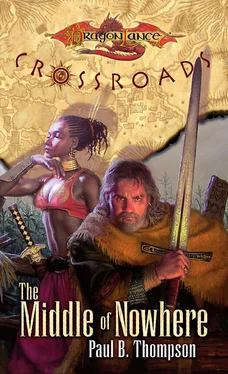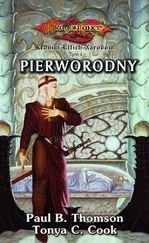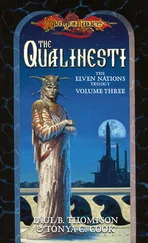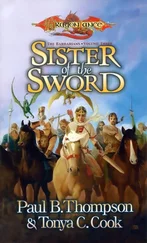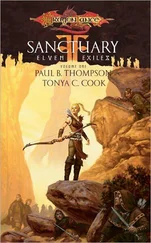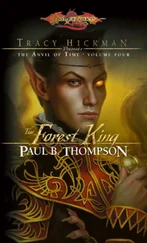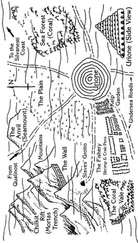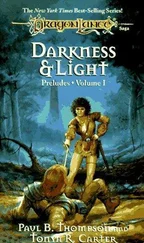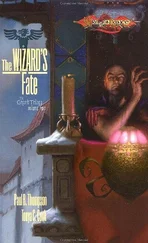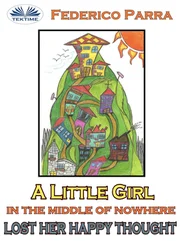Paul Thompson - The Middle of Nowhere
Здесь есть возможность читать онлайн «Paul Thompson - The Middle of Nowhere» весь текст электронной книги совершенно бесплатно (целиком полную версию без сокращений). В некоторых случаях можно слушать аудио, скачать через торрент в формате fb2 и присутствует краткое содержание. Год выпуска: 2013, ISBN: 2013, Издательство: Wizards of the Coast Publishing, Жанр: Фэнтези, на английском языке. Описание произведения, (предисловие) а так же отзывы посетителей доступны на портале библиотеки ЛибКат.
- Название:The Middle of Nowhere
- Автор:
- Издательство:Wizards of the Coast Publishing
- Жанр:
- Год:2013
- ISBN:978-0-7869-6486-4
- Рейтинг книги:3 / 5. Голосов: 1
-
Избранное:Добавить в избранное
- Отзывы:
-
Ваша оценка:
- 60
- 1
- 2
- 3
- 4
- 5
The Middle of Nowhere: краткое содержание, описание и аннотация
Предлагаем к чтению аннотацию, описание, краткое содержание или предисловие (зависит от того, что написал сам автор книги «The Middle of Nowhere»). Если вы не нашли необходимую информацию о книге — напишите в комментариях, мы постараемся отыскать её.
The Middle of Nowhere — читать онлайн бесплатно полную книгу (весь текст) целиком
Ниже представлен текст книги, разбитый по страницам. Система сохранения места последней прочитанной страницы, позволяет с удобством читать онлайн бесплатно книгу «The Middle of Nowhere», без необходимости каждый раз заново искать на чём Вы остановились. Поставьте закладку, и сможете в любой момент перейти на страницу, на которой закончили чтение.
Интервал:
Закладка:
Paul B. Thompson
The Middle of Nowhere
Before in Nowhere
Everyone comes from somewhere, the Elder used to say. Kender have a home, even if they leave it once and never return from their wanderings. Soldiers and priests, merchants and monsters, all have points of origin. A patch of ground, the shade of a tree, a pattern of stars overhead are all parts of home.
The village of Nowhere was just that: isolated, unknown and unremarked. A scholar could have pointed out the larger locale on a map, but no map bore the name of Nowhere. Unlike some hamlets kept secret and safe by high mountains or steaming swamps, Nowhere was nowhere simply because it was out of the way, a small spot in a large expanse. Riches and resources they had none. The terrain was nondescript grassland, amidst low hills crowned with stands of willow and alder. Too scrawny for lumber and too gnarled for spears or tool shafts, even the trees of Nowhere were of little use.
Despite the forgotten nature of the place, people did live there. A village had grown up around the only clear spring for two days’ ride in any direction. Gray-bearded villagers called it the Eternal Spring, for in all the unbroken history of their lives, it had never run dry.
Simple huts of wattle slathered with mud daub surrounded the spring in a horseshoe plan, the open end of the shoe facing west, where the villagers kept fields planted in onions, carrots, barley, and cabbage. Constant labor was required to make anything grow. The climate was dry, and some seasons the only thing that kept the crops alive was the ever-flowing spring.
It was late summer, and the harvest was four weeks away. A minor drought had plagued the region since high summer. The usual towering thunderstorms had all passed south of Nowhere, leaving the yellow soil dry as flour. When the wind huffed down from the north, it brought with it a cloud of dust that covered everything in a drab and desiccated ochre grit.
Parched through and through from his morning’s labors, Malek sought the old well. Sweat stung his eyes as he hauled up the bucket from the depths. The worn wooden pulley rattled and squeaked as the brimming bucket rose. Malek was pleased to see clear water sloshing as the container swayed upward. No matter how erratic the rains might be, the village could always rely on the ancient well.
Malek gathered in the bucket. He splashed a handful of water on the Ancestor’s head, a token of appreciation of the well’s steadfast bounty. The Ancestor was an upright lump of sandstone, as tall as his waist and red as the sunset, inset in the rubblestone wall around the well. Totally unlike the nondescript gray rocks found around Nowhere, the Ancestor had been brought to the village from some far-off place so long ago its exact point of origin was forgotten. In time it had become the totem of the village. Old folks in Nowhere believed it housed the spirits of every man, woman, and child who’d ever lived in the village, hence the epithet, “Ancestor.” Hearth tales told on long winter nights held the Ancestor was guardian of the Eternal Spring, with ancient and recondite powers.
Looking at the bucket, Malek frowned. The wooden sides were slick with slime. Someone was not doing their job. Every family in the village took turns caring for common property like the well. In summer, the bucket had to be scraped every few days to keep the slime off. It had been so neglected green moss was beginning to grow on the bottom. Malek poured the rest of the brimming bucket into a tall waterskin and tried to remember who had care of the well this month. Willat’s family? Old widow Naek? Or was it Bakar? It must be Bakar. He was known to be careless, and besides, he was unmarried and couldn’t slough the job onto a wife or child.
“How goes it, Malek?”
Bakar sauntered up, a sprig of barley in his teeth. The stem was yellow-green and thin like the crop in the fields.
“It goes dry,” Malek replied with a grunt. When Bakar looked alarmed, Malek quickly explained, “The weather, I mean. The well flows.”
Four times Malek dropped and retrieved the bucket. He hefted the now full skin onto his shoulder. Destined for his carrot patch, it held four buckets full, a heavy load. Even Malek’s sturdy knees bowed a bit under the burden. He passed his neighbor the slimy bucket without a word.
He looked out over the parchwork of gardens. It was midday, and everyone able-bodied was in the fields. Only crippled old folk and the smallest children remained in the village during the day. They kept inside, out of the sun. Nothing was stirring, not even the wind. Malek’s eyes narrowed.
“What’s that?” he said, puzzled.
Bakar dropped the bucket down the deep shaft. Before it hit the water he replied, “What’s what?”
“That dust.”
Bakar turned languidly to see what puzzled his neighbor. Though a young man, he moved more slowly than anyone else in the village, save the Elder himself.
Shading his eyes, Bakar perused the narrow column of yellow dust rising southeast of the village.
“Wind,” said Bakar, unimpressed.
“Wind’s out of the north,” Malek replied. “That dust is coming towards us, against the wind.”
As soon as he said it, both knew someone was coming. As no one ever came to Nowhere casually, visitors meant trouble.
“Sound the gong!” Malek said. “I’ll go to the fields!”
Bakar loped away, almost moving quickly. On a post between the last pair of houses in the village hung a slab of bronze, green with age. As Malek sprinted past, the phlegmatic farmer picked up the wooden mallet leaning against the post and started whacking the gong. The battered metal plate rang surprisingly clearly, and the sound carried far across the open land. By the time Malek reached the edge of the communal barley field, men and women were already gathering.
His elder brother Nils was there with his sixteen-year-old son Larem, the Elder’s daughter Caeta (herself the oldest woman in Nowhere), the tow-headed twins Lak and Wilf, and the other adults of the village.
“Why the alarm?” demanded Caeta. Malek, out of breath, simply pointed at the column of dust, now much closer than when he first spotted it. Grim-faced, Caeta shouldered her hoe and said, “Back to your homes, everyone!”
The fields rapidly emptied of farmers, each clutching whatever tool they happened to have-rakes, hoes, dibbles. Everyone converged on the clanging gong. Trailing the crowd, Malek took the opportunity to look for Laila, his bride-to-be. He spied her in the door of her family’s hut, her blind father leaning on her strong, brown arm.
The farmers collected around the bronze gong, which Bakar continued to beat until Sohn the brewer snatched the mallet from his hand. Joined by a throng of old folks and children, the villagers milled about in noisy confusion, everyone talking and no one listening.
Malek skirted the chaotic scene and hurried along the row of houses to Laila’s hut. Side by side, the resemblance between father and daughter was strong. They had the same sharp chin and straight nose, and identical brown eyes. Old Marren’s hair had once been honey-brown, like Laila’s. There the resemblance ended. Laila was tall, straight, and strong. The same wasting disease that had stolen Marren’s sight had shrunk his formerly powerful frame and turned his wispy hair white.
“It’s Malek,” Laila said for her father’s benefit. “What’s happening?”
“No one knows yet, but something’s coming-”
A piercing scream filled the air. All eyes turned toward the sound, which came from the cluster of gray-haired women gathered by their houses on the south side of the village. Trotting through the hot afternoon sun came a line of horsemen. The tired animals’ tongues were lolling and thickly coated with dust. Riding the thirsty beasts were figures in bizarre patchwork armor: bits of iron or bronze, mail or plate, wired and tied over thickly padded suits of leather. Cuisses, helmets, and schildrons were scuplted into hideous faces, skulls, and horned monsters. War and the elements gave these hideously mismatched suits a rusty patina that resembled splashes of dried blood.
Читать дальшеИнтервал:
Закладка:
Похожие книги на «The Middle of Nowhere»
Представляем Вашему вниманию похожие книги на «The Middle of Nowhere» списком для выбора. Мы отобрали схожую по названию и смыслу литературу в надежде предоставить читателям больше вариантов отыскать новые, интересные, ещё непрочитанные произведения.
Обсуждение, отзывы о книге «The Middle of Nowhere» и просто собственные мнения читателей. Оставьте ваши комментарии, напишите, что Вы думаете о произведении, его смысле или главных героях. Укажите что конкретно понравилось, а что нет, и почему Вы так считаете.
